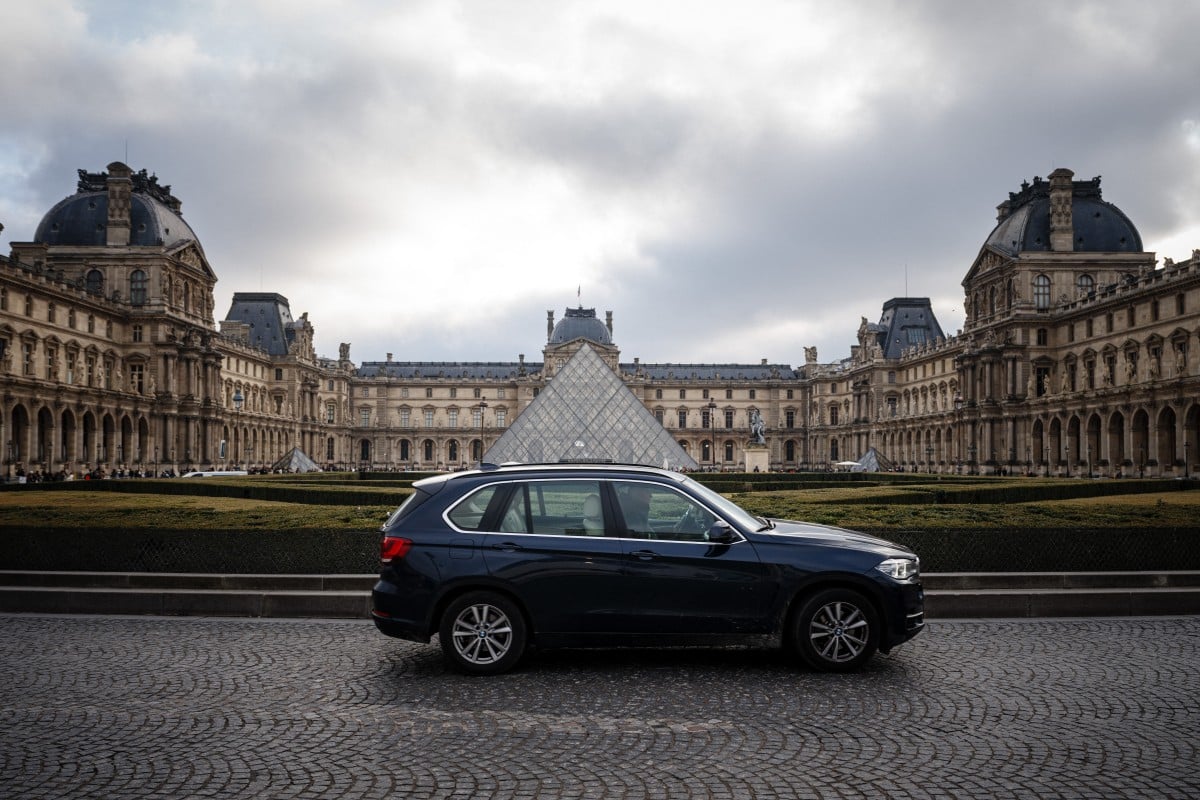Could Germany also introduce parking fees for SUVs?

Following a referendum in Paris to triple parking fees for non-resident SUVs, politicians and environmental groups in Germany have been calling for a similar increase. How likely is this in a country known for its love of cars?
Hanover's mayor Belit Onay spoke out in favour of higher parking fees for owners of large sports utility vehicles (SUVs). The Green party politician told Tagesspiegel that “the debate about the scarcity of public space and more appropriate pricing for parking must be conducted."
Onay’s comments come in response to a referendum in Paris which allowed city residents to decide whether parking fees should be tripled for visitors with SUVs. Paris voters approved the measure on Sunday, bumping the cost of one hour of parking from €6 to €18 for visiting SUVs.
Notably, city residents who own SUVs won't be affected by the change.
SUVs, which are significantly larger and heavier than standard passenger cars, have become a point of contention in urban centres due to the space they take up as well as their heightened impacts on pedestrian safety and environmental health.
READ ALSO: Why an anonymous group has been deflating tyres of SUVs across Germany
German Environmental Aid (DUH) has also called for an increase in parking fees following the example of Paris.
Jürgen Resch, Federal Managing Director of the DUH, said in a statement, that "these monster SUVs are increasingly blocking sidewalks and green spaces, endangering people who are walking or cycling.”
He added that just as there are regulatory limits on the size of heavy commercial vehicles, maximum size and weight specifications are needed for passenger cars to ensure they don’t exceed dimensions compatible with cities.
Germany's Environmental Agency (BUND) also called for higher parking fees so that parked cars do not unnecessarily block the use of public space and "the actual costs of maintaining parking areas" are covered.

A car drives past the Louvre Museum in Paris city centre on February 2th as Paris' city hall is organised a vote on February 4th on the creation of a special parking fee for the heaviest and most polluting cars and SUVs. (Photo by Dimitar DILKOFF / AFP)
DUH cites a study by the group Transport and Environment that found that cars have been trending larger in recent years – newly registered cars in Europe have become 10 cm wider on average over the last 20 years.
Policy makers can’t force automakers to make smaller cars, but one tool they can use to try to reverse the trend is to levy taxes and fees based on vehicle size or weight, which may discourage consumers from choosing larger cars in time.
Parking penalties are not unheard of in Germany
In the southwestern city of Tübingen, SUV owners have been paying 50 percent higher parking fees since 2022.
In Tübingen, an annual parking permit now costs €120 for a standard car and €180 for an SUV. That’s significantly more than the €30 annual resident parking permits sold in Munich, Düsseldorf or Dresden, or the €20.40 paid in Berlin for two year’s worth of parking.
Part of the justification for the higher fees is attributed to heavier vehicles taking up more space and also putting more wear on roads over time. For these reasons, Norway levies a vehicle tax based on cars’ curb weight, in addition to taxes on their carbon dioxide and nitrous oxide emissions. Some US cities, such as New York and Washington D.C. have also levied weight-based vehicle taxes in recent years.
According to data shared by FINN, a car subscription service, resident parking fees are relatively low across Germany. In 2019, resident parking passes were €827 in Stockholm and €535 in Amsterdam.
Speaking against weight-based parking fees, the General German Automobile Club (ADAC) told Tagesspiegel that higher parking fees were not a solution without elaborating on an alternative.
Can a car culture be changed?
Efforts aimed at discouraging car use in any form are sure to meet some resistance in Germany, where the car industry has long been a staple of the country’s economy.
Home to BMW, Audi and Volkswagen, Germany's car industry comes with a powerful lobby, and considerable influence over the country’s politics.
A driving force behind so-called ‘car bloat’, or the trend of cars getting bigger over time, is the fact that automakers can achieve larger profit margins by selling larger vehicles.
At the beginning of this year, the Research Society for Roads and Transport (FGSV) determined that due to cars’ growth, parking spaces in Germany should be built 15 centimetres wider and ten centimetres longer. But larger parking spaces can’t be easily added to many existing city streets.
"The trend in cars seems to know only one direction: ever bigger, ever heavier. This does not fit in with a time when we are discussing energy and land saving, climate and resource protection," Helmut Dedy, chief executive of the Association of German Cities, said in a statement.
He added that it is, "obvious to assign the actual costs for parking and driving to the large vehicles."
The recent referendum in Paris suggests that residents of Europe’s big cities are increasingly open to rethinking the cost of car use in city centres. But whether or not German policy makers are ready to join in remains to be seen.
Comments
See Also
Hanover's mayor Belit Onay spoke out in favour of higher parking fees for owners of large sports utility vehicles (SUVs). The Green party politician told Tagesspiegel that “the debate about the scarcity of public space and more appropriate pricing for parking must be conducted."
Onay’s comments come in response to a referendum in Paris which allowed city residents to decide whether parking fees should be tripled for visitors with SUVs. Paris voters approved the measure on Sunday, bumping the cost of one hour of parking from €6 to €18 for visiting SUVs.
Notably, city residents who own SUVs won't be affected by the change.
SUVs, which are significantly larger and heavier than standard passenger cars, have become a point of contention in urban centres due to the space they take up as well as their heightened impacts on pedestrian safety and environmental health.
READ ALSO: Why an anonymous group has been deflating tyres of SUVs across Germany
German Environmental Aid (DUH) has also called for an increase in parking fees following the example of Paris.
Jürgen Resch, Federal Managing Director of the DUH, said in a statement, that "these monster SUVs are increasingly blocking sidewalks and green spaces, endangering people who are walking or cycling.”
He added that just as there are regulatory limits on the size of heavy commercial vehicles, maximum size and weight specifications are needed for passenger cars to ensure they don’t exceed dimensions compatible with cities.
Germany's Environmental Agency (BUND) also called for higher parking fees so that parked cars do not unnecessarily block the use of public space and "the actual costs of maintaining parking areas" are covered.

DUH cites a study by the group Transport and Environment that found that cars have been trending larger in recent years – newly registered cars in Europe have become 10 cm wider on average over the last 20 years.
Policy makers can’t force automakers to make smaller cars, but one tool they can use to try to reverse the trend is to levy taxes and fees based on vehicle size or weight, which may discourage consumers from choosing larger cars in time.
Parking penalties are not unheard of in Germany
In the southwestern city of Tübingen, SUV owners have been paying 50 percent higher parking fees since 2022.
In Tübingen, an annual parking permit now costs €120 for a standard car and €180 for an SUV. That’s significantly more than the €30 annual resident parking permits sold in Munich, Düsseldorf or Dresden, or the €20.40 paid in Berlin for two year’s worth of parking.
Part of the justification for the higher fees is attributed to heavier vehicles taking up more space and also putting more wear on roads over time. For these reasons, Norway levies a vehicle tax based on cars’ curb weight, in addition to taxes on their carbon dioxide and nitrous oxide emissions. Some US cities, such as New York and Washington D.C. have also levied weight-based vehicle taxes in recent years.
According to data shared by FINN, a car subscription service, resident parking fees are relatively low across Germany. In 2019, resident parking passes were €827 in Stockholm and €535 in Amsterdam.
Speaking against weight-based parking fees, the General German Automobile Club (ADAC) told Tagesspiegel that higher parking fees were not a solution without elaborating on an alternative.
Can a car culture be changed?
Efforts aimed at discouraging car use in any form are sure to meet some resistance in Germany, where the car industry has long been a staple of the country’s economy.
Home to BMW, Audi and Volkswagen, Germany's car industry comes with a powerful lobby, and considerable influence over the country’s politics.
A driving force behind so-called ‘car bloat’, or the trend of cars getting bigger over time, is the fact that automakers can achieve larger profit margins by selling larger vehicles.
At the beginning of this year, the Research Society for Roads and Transport (FGSV) determined that due to cars’ growth, parking spaces in Germany should be built 15 centimetres wider and ten centimetres longer. But larger parking spaces can’t be easily added to many existing city streets.
"The trend in cars seems to know only one direction: ever bigger, ever heavier. This does not fit in with a time when we are discussing energy and land saving, climate and resource protection," Helmut Dedy, chief executive of the Association of German Cities, said in a statement.
He added that it is, "obvious to assign the actual costs for parking and driving to the large vehicles."
The recent referendum in Paris suggests that residents of Europe’s big cities are increasingly open to rethinking the cost of car use in city centres. But whether or not German policy makers are ready to join in remains to be seen.
Join the conversation in our comments section below. Share your own views and experience and if you have a question or suggestion for our journalists then email us at [email protected].
Please keep comments civil, constructive and on topic – and make sure to read our terms of use before getting involved.
Please log in here to leave a comment.